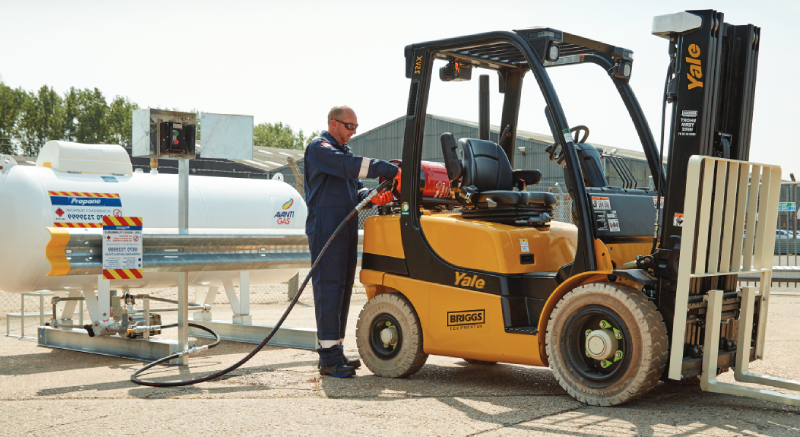What Are The Different Forklift Fuel Types?
Forklifts can be powered by three main fuel options, which are Electric, Diesel and LPG.
Each of the three main fuel options for forklifts has unique characteristics and specific use cases, here’s what you need to know:
Electric Forklifts
Electric forklifts are powered by rechargeable batteries, these are an excellent choice for indoor use due to their zero emissions. They’re quieter than their counterparts, making them ideal for noise-sensitive environments. However, they require charging infrastructure and their operation time is limited to their battery life.
Another important factor to consider when looking at electric forklifts is the type of battery it uses. Different battery types can affect the performance, lifespan and maintenance needs of the forklift.
You have two main options for battery types: Lead Acid and Lithium ion. Each has its own set of advantages and considerations, so it’s essential to understand these before making your decision.
Lead Acid Batteries:
Advantages: Lower upfront cost, widely used and easy to replace.
Considerations: Require regular maintenance, longer charging times, and they’re heavier which might affect forklift balance.
Lithium-ion Batteries:
Advantages: Longer lifespan, faster charging times, and virtually maintenance-free.
Considerations: Higher initial cost, and specific disposal requirements due to environmental considerations.
The final key point to consider when looking at electric forklifts is the initial cost versus long-term value. While electric forklifts often require a larger upfront investment, they can potentially provide better value in the long run. This is mainly due to lower fuel costs, as electricity is typically cheaper than gas or diesel.
Find Your Perfect Forklift
Compare Quotes from Local Forklift Dealerships


Enter Requirements


We Find the Best Deal


Receive your Quote
Diesel Forklifts
Diesel forklifts are known for their robust performance and ability to handle heavy-duty tasks. They are typically used outdoors due to their emission levels. Diesel forklifts can operate for prolonged periods, but they are generally noisier and less environmentally friendly compared to electric forklifts.
A major benefit of diesel forklifts is their adaptability to various weather conditions. Unlike some other types, diesel forklifts can operate efficiently under a wide range of weather conditions. This makes them a versatile choice for businesses with diverse operational environments.
Liquified Petroleum Gas (LPG) Forklifts
LPG forklifts, sometimes known as gas forklifts, offer a balance between power and cleanliness, LPG forklifts can be used both indoors and outdoors. They have longer run times compared to electric forklifts, but they require a storage area for gas cylinders. The cost of fuel can also be a significant factor when considering LPG forklifts.
When comparing the running costs of LPG and diesel, it’s important to consider fuel prices, cost per kilometre, efficiency, and maintenance.

Source: Avantigas.com
Generally, LPG is cheaper per litre than diesel, but diesel engines are usually more fuel-efficient, meaning you may need less diesel to cover the same distance. However, the cost of running per kilometre tends to be a little lower for LPG.
Maintenance can also factor into overall costs, with diesel engines often being more expensive to maintain. Do note that these are broad comparisons and actual costs can vary based on specific vehicle models, driving habits, and local fuel prices.